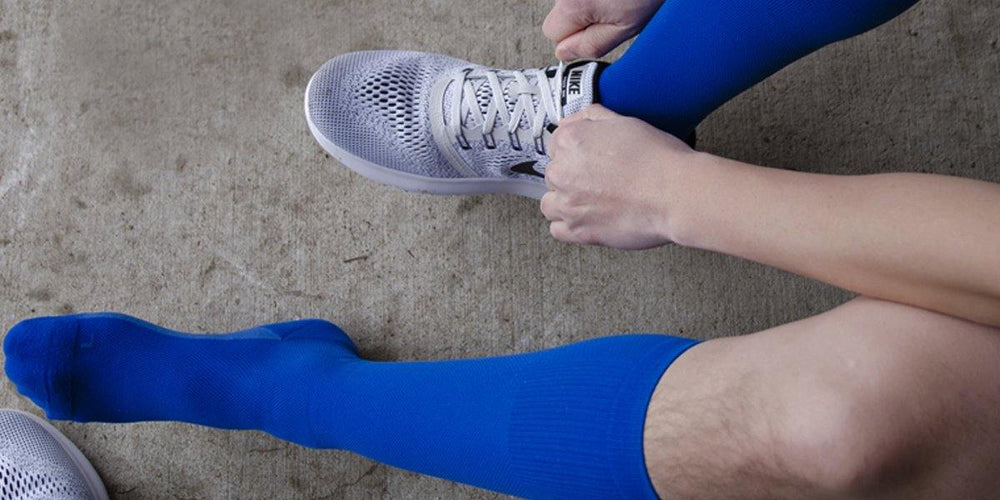Running Compression Socks: Fad or Essential?

What are compression socks for and is it time for you to get a pair? Learn all about the benefits of using compression socks and how it can beef up your everyday and competitive running gear.
When you start taking running seriously, it’s going to be hard not to come across compression socks. It’s mentioned a lot in running tips and you might notice your fellow runners using them. During races, it’s not unusual to see most participants sporting this type of gear.
If you ask top athletes, they’re most likely going to tell you that compression socks or sleeves have taken their running game to a whole new level. Countless runners have reported that by using compression socks, they get injured less often, they recover much quicker, and their performance has reached new heights.
But are running compression socks really worth all that hype? Is there actual research that can back up what these runners are saying? That’s what you’re going to find out in this post.
How do compression socks differ from ordinary socks?
Compression socks look a lot like normal knee-high socks. On the other hand, compression sleeves start at the ankle and end just below the knee. Both, however, are a bit snugger than ordinary socks because they are intended to compress your legs.
How can I benefit from wearing compression socks for running?
Optimizes the oxygen cycle
Make no mistake: compression socks for runners are not just socks that are a little too tight. They’re a bit more sophisticated than that. They provide graduated compression, which means that they’re looser towards the knee and tighter towards the ankle. Why were they designed this way?
This graduated compression helps combat the effects of gravity in your legs. As an effect, your blood gets funneled back to your heart much quicker. The tightness creates a specific pressure that basically squeezes up your leg fluid with every step. Because the oxygen cycle is hastened, you get more nutrients to the muscle group that needs it the most as you run.
Reduces muscle soreness
The culprit of muscle soreness is lactic acid. Your body could produce more amounts of this waste product when you overwork your muscles. Because of poor or unaided blood circulation, you increase your chances of building up lactic acid in your leg muscles, which is why you feel like you can barely stand the day after a long running session.
As mentioned above, compression socks constrict your veins. Now, think of a pipe with water running through it. What would happen if you make that pipe narrower? The velocity of the water increases. The very same principle can be applied to your veins.
When your veins are constricted, the faster the oxygenated blood and lactic acid leaves your legs and makes their way to your heart. When these elements don’t linger in your legs for too long, you’re not going to get as sore after you run.
Decreases swelling and cramping
When your leg muscles are tightly contained, you minimize excess movement in them. What does this mean for a runner? Running takes considerable effort. When you wear compression socks, you’re not going to have to exert as much effort and you won’t have to tire your legs out more than necessary. This means that you’re not going to be using as much muscle, which greatly eases the feeling of fatigue. A lot of athletes swear that compression socks help them go on longer runs because they don’t tire out as easily.
Swelling is another thing that runners are very familiar with. If you run regularly, your feet, ankles, and legs could get swollen because of fluid buildup. Compression socks essentially minimizes the room for this excess liquid, which causes the swelling.
Are there studies that prove the efficacy of compression socks for runners?
Yes, there are studies that show how athletes who wear compression socks for 48 hours after running a marathon recovered much quicker than those who didn't. Another study indicates that in fact, wearing compression socks has positive effects on blood flow and volume.
How to choose compression socks. What size should I get?
People who haven’t tried compression socks are mostly worried about sizing, which makes sense. You don’t want to wear socks that are too tight because it might cause bruising. Before you shop for your first pair, make sure you get your tape measure out and measure your calves and ankles to find the right fit.
Will I be a better runner if I wear running compression socks?
Pulling on a pair of running compression socks isn’t automatically going to make you a better runner. However, having them handy will help you recover from a particularly difficult run and power through the last leg of a long race. At the end of the day, compression socks are a great running accessory. You will still need to practice healthy running habits and consult with a medical professional to deal with recurring leg pain.

Leave a comment